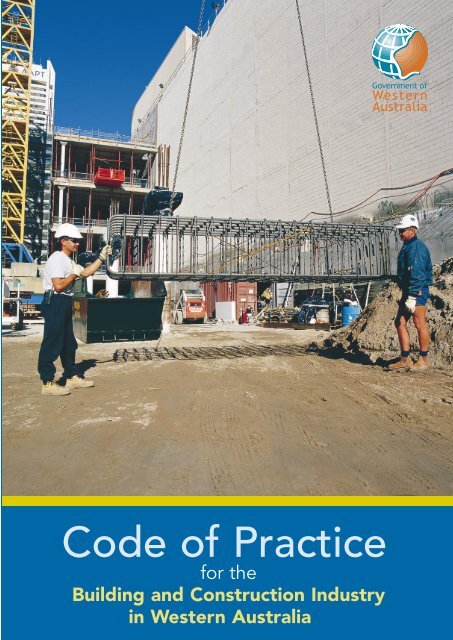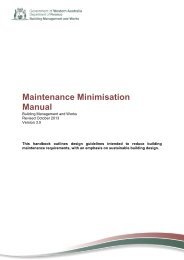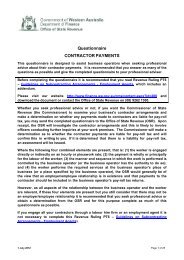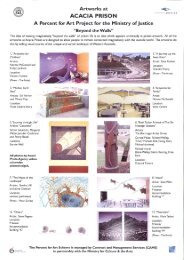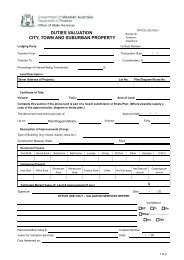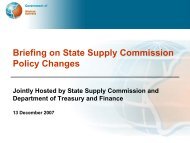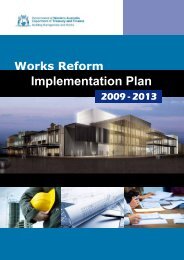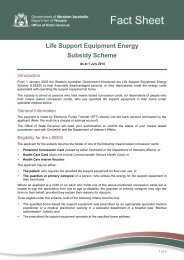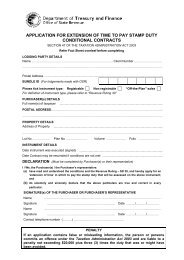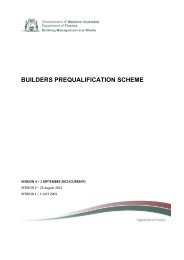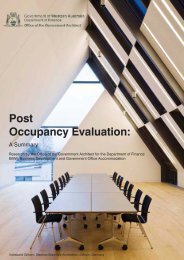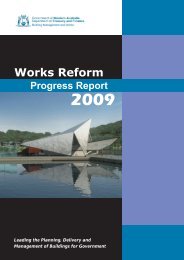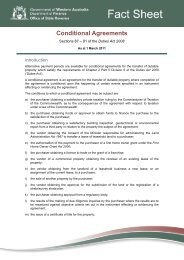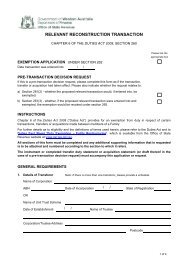Code of Practice for the Building and Construction Industry of ...
Code of Practice for the Building and Construction Industry of ...
Code of Practice for the Building and Construction Industry of ...
Create successful ePaper yourself
Turn your PDF publications into a flip-book with our unique Google optimized e-Paper software.
<strong>Code</strong> <strong>of</strong> <strong>Practice</strong><strong>for</strong> <strong>the</strong><strong>Building</strong> <strong>and</strong> <strong>Construction</strong> <strong>Industry</strong>in Western Australia
© January 2002 Government <strong>of</strong> Western AustraliaABN 32174 173 572This document is available on request in alternative<strong>for</strong>mats such as large type, audio tape, computerdisk <strong>and</strong> Braille.
Foreword<strong>Building</strong> <strong>and</strong> construction is a major industry in Western Australia interms <strong>of</strong> number <strong>of</strong> employers, employees <strong>and</strong> investment dollars. Animperative <strong>for</strong> <strong>the</strong> industry is to be economically viable <strong>and</strong> attractiveto potential developers wishing to invest in this State. For this reason,<strong>the</strong> <strong>Code</strong> <strong>of</strong> <strong>Practice</strong> has been revised to make it more relevant to <strong>the</strong>needs <strong>and</strong> expectations <strong>of</strong> <strong>the</strong> industry in <strong>the</strong> 21st Century.This <strong>Code</strong> <strong>of</strong> <strong>Practice</strong> is <strong>the</strong> outcome <strong>of</strong> genuine dialogue betweenemployer groups, unions <strong>and</strong> <strong>the</strong> Government. The end result is adocument that emphasises best practice in all areas ra<strong>the</strong>r than merelybeing a document listing <strong>the</strong> legislative obligations <strong>of</strong> industry parties.This <strong>Code</strong> <strong>of</strong> <strong>Practice</strong> has much to recommend it to <strong>the</strong> industry. Ifobserved by all parties <strong>the</strong>n it will promote greater levels <strong>of</strong>responsibility <strong>and</strong> maturity within <strong>the</strong> industry. It is <strong>the</strong>se characteristicswhich will attract investors <strong>and</strong> development to this State <strong>the</strong>rebyproviding employment opportunities <strong>and</strong> business growth.I encourage all industry to observe <strong>the</strong> <strong>Code</strong>, not just in meeting itsminimum requirements, but ra<strong>the</strong>r, by demonstrating behaviour thatexceeds <strong>the</strong> <strong>Code</strong>’s expectations.I commend <strong>the</strong> <strong>Code</strong> <strong>of</strong> <strong>Practice</strong> to <strong>the</strong> building <strong>and</strong> constructionindustry in Western Australia.John Kobelke MLAMinister <strong>for</strong> Consumer <strong>and</strong> Employment ProtectionJanuary 2002
Contents1.0 Preamble 12.0 Objectives 23.0 Application 34.0 <strong>Code</strong> monitoring committee 55.0 Best practice <strong>and</strong> continuous improvement 65.1.0 Occupational safety <strong>and</strong> health 75.2.0 Training <strong>and</strong> skill development 86.0 Contract administration requirements 107.0 Tendering practices 117.1.0 Calling <strong>of</strong> tenders 117.2.0 Collusive tendering 148.0 Industrial relations 158.1.0 Awards <strong>and</strong> legal obligations relating toemployment 158.2.0 Industrial associations 158.3.0 Industrial disputation 168.4.0 Consent mediation 168.5.0 Procedures <strong>for</strong> <strong>the</strong> operation <strong>of</strong> private mediators 17
1.0 Preamble1.1 This <strong>Code</strong> <strong>of</strong> <strong>Practice</strong> <strong>for</strong> <strong>the</strong> <strong>Building</strong> <strong>and</strong> <strong>Construction</strong> <strong>Industry</strong>in Western Australia, (<strong>the</strong> <strong>Code</strong>), is a key strategy <strong>of</strong> <strong>the</strong>Government <strong>of</strong> Western Australia to promote best practice <strong>and</strong>foster a culture <strong>of</strong> co-operation within <strong>the</strong> building <strong>and</strong>construction industry.1.2 The Government is committed to assisting <strong>the</strong> industrymaximise its per<strong>for</strong>mance, as it will benefit all industryparticipants <strong>and</strong> <strong>the</strong> well being <strong>of</strong> <strong>the</strong> State’s economy.1.3 This <strong>Code</strong> supplements o<strong>the</strong>r industry re<strong>for</strong>m strategies <strong>and</strong>Government policies.1.4 <strong>Industry</strong> participants are expected to comply with all aspects <strong>of</strong>this <strong>Code</strong>.1.5 To encourage all industry parties to observe this <strong>Code</strong>, <strong>the</strong>Government endorses <strong>the</strong> <strong>Code</strong> Monitoring Committee.1.6 Implementation guidelines <strong>and</strong> Government policy documentswill extend <strong>the</strong> provisions <strong>of</strong> <strong>the</strong> <strong>Code</strong> <strong>and</strong> provide detailedinterpretation <strong>of</strong> <strong>the</strong> intent <strong>of</strong> <strong>the</strong> <strong>Code</strong> <strong>for</strong> specific situations<strong>and</strong> industry sectors.1.7 When developed, implementation guidelines dealing withGovernment expectations <strong>of</strong> industry participants are to be readin conjunction with this <strong>Code</strong>.1.8 This revised <strong>Code</strong> is to take effect from January 2002.CODE OF PRACTICE <strong>for</strong> <strong>the</strong> <strong>Building</strong> <strong>and</strong> <strong>Construction</strong> <strong>Industry</strong> in Western Australia 1
2.0 Objectives2.1 The objectives <strong>of</strong> this <strong>Code</strong> are to:a) improve efficiency <strong>and</strong> productivity in <strong>the</strong> building <strong>and</strong>construction industry by discouraging unsatisfactorypractices, including those that arise from short-termexpedient decision making;b) encourage industry participants to comply with <strong>the</strong> spirit<strong>and</strong> intent <strong>of</strong> all laws relating to <strong>the</strong> industry;c) create an industry body to monitor compliance with <strong>the</strong><strong>Code</strong>;d) make best practice <strong>and</strong> continuous improvement anessential part <strong>of</strong> <strong>the</strong> industry, demonstrated by behaviourthat exceeds mere compliance with regulatoryrequirements;e) improve <strong>the</strong> st<strong>and</strong>ard <strong>of</strong> occupational safety <strong>and</strong> healthacross <strong>the</strong> industry;f) foster growth in <strong>the</strong> level <strong>of</strong> training <strong>and</strong> skill developmentin <strong>the</strong> industry;g) improve <strong>the</strong> industry’s quality <strong>of</strong> contract administration<strong>and</strong> tendering practices; <strong>and</strong>h) encourage industry participants to embrace a co-operativeapproach towards industrial relations.2 CODE OF PRACTICE <strong>for</strong> <strong>the</strong> <strong>Building</strong> <strong>and</strong> <strong>Construction</strong> <strong>Industry</strong> in Western Australia
3.0 Application3.1 The building <strong>and</strong> construction industry includes all activities in,or in connection with, building <strong>and</strong> construction <strong>and</strong>engineering construction work in any industry or on any site.3.2 Without limiting <strong>the</strong> generality <strong>of</strong> this definition, <strong>the</strong> building<strong>and</strong> construction industry specifically includes:a) all Government funded building, construction <strong>and</strong>maintenance contracts <strong>and</strong> consultant commissions within<strong>the</strong> building <strong>and</strong> construction industry; <strong>and</strong>b) all private sector <strong>and</strong>/or non-Government building,construction <strong>and</strong> maintenance contracts <strong>and</strong> consultantcommissions within <strong>the</strong> State.3.3 The requirement to comply with <strong>the</strong> <strong>Code</strong> shall extend to, butwill not be limited to, <strong>the</strong> following parties:a) principal contractors, sub-contractors <strong>and</strong> suppliers;b) employers <strong>and</strong> employees;c) consultants;d) all levels <strong>of</strong> Government;e) clients, owners <strong>and</strong> developers;f) organisations, associations or persons o<strong>the</strong>rwise involvedin, or associated with, <strong>the</strong> industry <strong>and</strong> fulfilling arepresentative role; <strong>and</strong>g) unions, <strong>the</strong>ir <strong>of</strong>ficials, <strong>of</strong>ficers <strong>and</strong> members.3.4 Everyone covered by <strong>the</strong> <strong>Code</strong> shall be expected to observe all<strong>of</strong> its provisions applicable to <strong>the</strong>ir activities.CODE OF PRACTICE <strong>for</strong> <strong>the</strong> <strong>Building</strong> <strong>and</strong> <strong>Construction</strong> <strong>Industry</strong> in Western Australia 3
3.5 Any person seeking to be involved with Government building<strong>and</strong> construction projects, or who is involved with such projects,is required to observe all aspects <strong>of</strong> <strong>the</strong> <strong>Code</strong> <strong>and</strong> whereapplicable, <strong>the</strong> Implementation Guidelines <strong>and</strong> Governmentpolicies.3.6 All levels <strong>of</strong> Government are to observe this <strong>Code</strong> <strong>and</strong> <strong>the</strong>Implementation Guidelines when:a) putting out tenders <strong>for</strong> building <strong>and</strong> construction work;b) assessing bids <strong>for</strong> such work; <strong>and</strong>c) managing building <strong>and</strong> construction projects.4 CODE OF PRACTICE <strong>for</strong> <strong>the</strong> <strong>Building</strong> <strong>and</strong> <strong>Construction</strong> <strong>Industry</strong> in Western Australia
4.0 <strong>Code</strong> monitoring committee4.1 To encourage industry parties to observe <strong>the</strong> <strong>Code</strong>, <strong>the</strong> <strong>Code</strong>Monitoring Committee (CMC) has been established.4.2 The CMC is made up <strong>of</strong> five members chosen by <strong>the</strong> Minister<strong>for</strong> Consumer <strong>and</strong> Employment Protection. Three <strong>of</strong> <strong>the</strong> fivemembers are called on at any one time to deal with specificmatters brought to <strong>the</strong> CMC’s attention. The CMC meetsregularly, at least every six months, or as required.4.3 The CMC receives complaints <strong>of</strong> alleged breaches <strong>of</strong> <strong>the</strong> <strong>Code</strong>.It does not receive complaints relating to industrial relationsmatters nor matters that are be<strong>for</strong>e <strong>the</strong> courts or being dealtwith by o<strong>the</strong>r <strong>for</strong>mal dispute resolution processes.4.4 Any person wishing to report an alleged breach <strong>of</strong> <strong>the</strong> <strong>Code</strong>must do so in writing to <strong>the</strong> CMC’s Secretariat.4.5 The CMC has no statutory powers to determine matters, nor isit a dispute settlement body. The CMC does not allow legalpractitioners or legal representatives to participate in arguing<strong>the</strong> merits or o<strong>the</strong>rwise <strong>of</strong> matters brought to its attention.4.6 The CMC reports on issues <strong>for</strong> <strong>the</strong> benefit <strong>of</strong> <strong>the</strong> Minister <strong>of</strong>Consumer <strong>and</strong> Employment Protection. The Minister will takenote <strong>of</strong> issues reported by <strong>the</strong> CMC <strong>and</strong> determine what course<strong>of</strong> action is appropriate.4.7 The CMC Secretariat is Mr Warren Milward. His contact details are:Phone: (618) 9222 7615Email: wmilward@doplar.wa.gov.auFacsimile: (618) 9222 7777Mail Address: The Secretariat, <strong>Code</strong> Monitoring Committee,Department <strong>of</strong> Consumer <strong>and</strong> Employment Protection,2 Havelock Street, WEST PERTH WA 6005CODE OF PRACTICE <strong>for</strong> <strong>the</strong> <strong>Building</strong> <strong>and</strong> <strong>Construction</strong> <strong>Industry</strong> in Western Australia 5
5.0 Best practice <strong>and</strong> continuousimprovement5.0.1 A positive commitment to best practice is expected <strong>of</strong> allindustry participants <strong>and</strong> may be tested <strong>and</strong> measured usingpre-qualification criteria <strong>and</strong> o<strong>the</strong>r selection processes whereverpossible.5.0.2 Contractors, sub-contractors, industry suppliers <strong>and</strong> o<strong>the</strong>rservice providers may be expected to demonstrate bestpractice by reference to past per<strong>for</strong>mance or by <strong>the</strong>implementation <strong>of</strong> appropriate business operating systems <strong>and</strong>st<strong>and</strong>ards.5.0.3 These may also include st<strong>and</strong>ards <strong>of</strong> environmentalmanagement <strong>and</strong> <strong>the</strong> adoption <strong>of</strong> practices that go beyondmere compliance with regulatory requirements. <strong>Industry</strong>participants may be monitored during <strong>the</strong> contract period.5.0.4 This commitment will be evidenced by continuous improvement in:a) occupational safety <strong>and</strong> health;b) training <strong>and</strong> skills development;c) business practices <strong>and</strong> relationships;d) use <strong>of</strong> technology <strong>and</strong> innovation in construction;e) environmental management;f) administration <strong>and</strong> tendering;g) industrial relations;h) value <strong>for</strong> money;i) pre-qualification <strong>of</strong> contractors <strong>and</strong> sub-contractors;6 CODE OF PRACTICE <strong>for</strong> <strong>the</strong> <strong>Building</strong> <strong>and</strong> <strong>Construction</strong> <strong>Industry</strong> in Western Australia
j) security <strong>of</strong> payment; <strong>and</strong>k) return to meaningful work <strong>and</strong> rehabilitation <strong>of</strong> injuredemployees.5.1.0 Occupational safety <strong>and</strong> health5.1.1 The building <strong>and</strong> construction industry values <strong>the</strong> safety, health<strong>and</strong> well being <strong>of</strong> all people involved with its activities <strong>and</strong> iscommitted to achieving <strong>the</strong> highest st<strong>and</strong>ard <strong>of</strong> safety <strong>and</strong>health per<strong>for</strong>mance.5.1.2 To demonstrate clear <strong>and</strong> committed leadership, <strong>the</strong> industryparticipants should observe <strong>the</strong> following expectations:a) comply, as a minimum requirement, with all relevantoccupational safety <strong>and</strong> health legislation. This includescomplying with <strong>the</strong> consultation requirements <strong>and</strong> <strong>the</strong>provisions <strong>for</strong> resolution <strong>of</strong> issues set out in <strong>the</strong>Occupational Safety <strong>and</strong> Health Act 1984 (<strong>the</strong> Act);b) ensure <strong>the</strong> provision <strong>of</strong> suitable accredited training <strong>for</strong>workers <strong>and</strong> management. Where on-site safety orconsultative committees are <strong>for</strong>med or exist, <strong>the</strong> memberswill be adequately trained in occupational safety <strong>and</strong>health;c) implement safety management systems on all projects thatestablish continuous improvement processes to ensurethat, as far as practicable, <strong>the</strong> safety <strong>and</strong> health hazards areidentified, <strong>and</strong> <strong>the</strong> risks are assessed <strong>and</strong> controlled;d) provide <strong>the</strong> people working in <strong>the</strong> industry with <strong>the</strong>opportunity to assist in <strong>the</strong> development <strong>and</strong>implementation <strong>of</strong> <strong>the</strong>se management systems;CODE OF PRACTICE <strong>for</strong> <strong>the</strong> <strong>Building</strong> <strong>and</strong> <strong>Construction</strong> <strong>Industry</strong> in Western Australia 7
e) set priorities <strong>and</strong> objectives based on <strong>the</strong> risk assessmentsthat are measurable <strong>and</strong> achievable. Regularly reviewper<strong>for</strong>mance against <strong>the</strong> set objectives with <strong>the</strong> aim <strong>of</strong>continuously improving per<strong>for</strong>mance;f) ensure people working in <strong>the</strong> industry have <strong>the</strong> skills,equipment <strong>and</strong> training required to per<strong>for</strong>m <strong>the</strong>ir taskssafely <strong>and</strong> without harm to <strong>the</strong>ir health; <strong>and</strong>g) ensure safety induction/training programs incorporatein<strong>for</strong>mation on <strong>the</strong>ir management systems <strong>and</strong> ensureunderst<strong>and</strong>ing <strong>of</strong> <strong>the</strong> duties placed on <strong>the</strong> various partiesby <strong>the</strong> Act.5.2.0 Training <strong>and</strong> skill development5.2.1 <strong>Industry</strong>-wide flexible, accessible <strong>and</strong> innovative approaches toskill development will enable <strong>the</strong> building <strong>and</strong> constructionindustry to react positively to <strong>the</strong> changing dem<strong>and</strong>s <strong>of</strong> <strong>the</strong>workplace, <strong>and</strong> provide opportunities <strong>for</strong> <strong>the</strong> work<strong>for</strong>ce toobtain nationally recognised qualifications.5.2.2 By integrating training <strong>and</strong> skill development into managementprocesses <strong>and</strong> project management, enterprises can positivelyreact to changing knowledge <strong>and</strong> skill requirements.Compliance with policies such as <strong>the</strong> State Government’sPriority Access Policy on public sector projects is a major step inencouraging a commitment to training.5.2.3 The Priority Access Policy initiative is aimed at usingGovernment procurement <strong>and</strong> contracting to increase training<strong>and</strong> employment opportunities <strong>for</strong> Western Australian jobseekers. <strong>Industry</strong> participants are expected to implement asystematic <strong>and</strong> rigorous approach to training <strong>and</strong> skilldevelopment to ensure an appropriate number <strong>of</strong> trainees <strong>and</strong>apprentices are engaged in <strong>the</strong> industry <strong>and</strong> on site.8 CODE OF PRACTICE <strong>for</strong> <strong>the</strong> <strong>Building</strong> <strong>and</strong> <strong>Construction</strong> <strong>Industry</strong> in Western Australia
5.2.4 Training <strong>and</strong> skill development associated with constructionprojects will be based on:a) compliance with <strong>the</strong> Government’s relevant training, skilldevelopment <strong>and</strong> equal employment opportunity policies<strong>for</strong> <strong>the</strong> construction industry;b) commitment to training <strong>for</strong> <strong>the</strong> next generation <strong>of</strong> building<strong>and</strong> construction industry workers through accreditedtraining programs;c) commitment to skilling workers through accreditedprograms to support workplace safety <strong>and</strong> technologicalchange;d) equal employment strategies in non-traditional areas; <strong>and</strong>e) commitment to training, which leads to nationallyrecognised qualifications.CODE OF PRACTICE <strong>for</strong> <strong>the</strong> <strong>Building</strong> <strong>and</strong> <strong>Construction</strong> <strong>Industry</strong> in Western Australia 9
6.0 Contract administration requirements6.1 All individuals <strong>and</strong> parties involved in <strong>the</strong> administration <strong>of</strong>contracts shall have a commitment to:a) co-operating with clients, principal contractors, subcontractors,consultants <strong>and</strong> suppliers in <strong>the</strong> administration<strong>of</strong> <strong>the</strong> contract to enable <strong>the</strong> contractor, consultant or <strong>the</strong>supplier to fulfil <strong>the</strong>ir contractual obligations;b) dealing with contractual claims in a timely manner;c) ensuring <strong>the</strong> timely processing <strong>and</strong> payment <strong>of</strong> contractualentitlements;d) submitting accurate <strong>and</strong> fair payment claims;e) complying with any relevant legislation or contract termsconcerning payment;f) protecting agreed commercial-in-confidence in<strong>for</strong>mation;g) co-operating with contracting parties in <strong>the</strong> administration <strong>of</strong>contracts to enable <strong>the</strong>m to fulfil <strong>the</strong>ir contractual obligations;h) ensuring that time <strong>and</strong> cost overruns are mitigated by cooperativeef<strong>for</strong>ts to solve problems so that <strong>the</strong>y do notdevelop into claims or disputes;i) ensuring an appropriate level <strong>of</strong> competence in thosepersons appointed to administer contracts;j) responding promptly to reasonable requests <strong>for</strong> advice<strong>and</strong> in<strong>for</strong>mation; <strong>and</strong>k) ensuring that a co-operative approach to dispute resolution isadopted <strong>and</strong> that litigation is reserved as a last resort.10 CODE OF PRACTICE <strong>for</strong> <strong>the</strong> <strong>Building</strong> <strong>and</strong> <strong>Construction</strong> <strong>Industry</strong> in Western Australia
7.0 Tendering practices7.0.1 The clauses in this section relate to tendering issues. Allindividuals <strong>and</strong> parties involved with <strong>the</strong> tendering process arerequired to comply with <strong>the</strong> conditions in this section.7.1.0 Calling <strong>of</strong> tenders7.1.1 Tendering at all levels in <strong>the</strong> industry must be conductedhonestly <strong>and</strong> fairly;7.1.2 Parties shall not seek tenders without a firm intention toproceed. Be<strong>for</strong>e calling tenders, <strong>the</strong> principal shall arrangeadequate finance to carry out <strong>the</strong> work. The party callingtenders shall have regard to <strong>the</strong> costs to <strong>the</strong> industry <strong>and</strong> <strong>the</strong>community at large, <strong>and</strong> avoid multiple bids, or repeatedrounds <strong>of</strong> tendering;7.1.3 Tenderers shall not be charged to obtain tender documents.Tender deposits are acceptable but shall be refunded onsubmission <strong>of</strong> a con<strong>for</strong>ming bid;7.1.4 The following in<strong>for</strong>mation should be provided in any invitationto tender:a) name (including ACN <strong>and</strong> ABN) <strong>and</strong> registered <strong>of</strong>fice <strong>of</strong>principal, architect, quantity surveyor, <strong>and</strong> o<strong>the</strong>r majorconsultants;b) location <strong>of</strong> site;c) general description <strong>of</strong> work <strong>and</strong> some indication <strong>of</strong> sizeincluding specific requirements;d) type <strong>of</strong> contract <strong>and</strong> any special conditions beingcontemplated; <strong>and</strong>e) proposed date <strong>for</strong> issue <strong>of</strong> tender documents <strong>and</strong>submission <strong>of</strong> tenders.CODE OF PRACTICE <strong>for</strong> <strong>the</strong> <strong>Building</strong> <strong>and</strong> <strong>Construction</strong> <strong>Industry</strong> in Western Australia 11
7.1.5 Where <strong>the</strong> principal imposes a time frame <strong>for</strong> <strong>the</strong> project, thattime frame must be reasonable.7.1.6 Conditions <strong>of</strong> tendering must be <strong>the</strong> same <strong>and</strong> be fair <strong>and</strong>reasonable <strong>for</strong> each tenderer on any particular project.7.1.7 Unless o<strong>the</strong>rwise specifically required, “general conditions <strong>of</strong>contract” that are st<strong>and</strong>ard in <strong>the</strong> industry or relevant industrysector will be used. Special conditions will only be used whenspecific site <strong>and</strong> project requirements make <strong>the</strong> “generalconditions” unworkable or unfair.7.1.8 “General conditions <strong>of</strong> contract” <strong>and</strong> any “special conditions”should observe <strong>the</strong> principle that <strong>the</strong> party best able to controla risk should bear that risk.7.1.9 Late tenders shall not be accepted.7.1.10 Tender documents must specify <strong>the</strong> client’s requirementsclearly <strong>and</strong> indicate <strong>the</strong> criteria <strong>for</strong> evaluation.7.1.11 Where quantities are provided by <strong>the</strong> principal, <strong>the</strong>y shall bemeasured in accordance with <strong>the</strong> current edition <strong>of</strong> <strong>the</strong>Australian St<strong>and</strong>ard Method <strong>of</strong> Measurement <strong>of</strong> <strong>Building</strong>Works.7.1.12 The time <strong>for</strong> closing <strong>of</strong> tenders should not be earlier than2.00pm <strong>and</strong> tenders should not close on a Monday or a dayfollowing a public holiday.7.1.13 The confidentiality <strong>of</strong> all in<strong>for</strong>mation provided in <strong>the</strong> tenderingprocess shall be preserved.7.1.14 Except where a quality assured or audited tender process isused, tenders shall be publicly opened <strong>and</strong> read immediatelyfollowing <strong>the</strong> time <strong>of</strong> closing <strong>of</strong> tenders.7.1.15 As soon as practicable after <strong>the</strong> opening <strong>of</strong> tenders, tenderersshall be advised <strong>of</strong> <strong>the</strong> prices received or when <strong>the</strong>ir tendersare no longer under active consideration.12 CODE OF PRACTICE <strong>for</strong> <strong>the</strong> <strong>Building</strong> <strong>and</strong> <strong>Construction</strong> <strong>Industry</strong> in Western Australia
7.1.16 If <strong>the</strong> principal considers that <strong>the</strong>re may be an error in anytender that cannot be corrected without unfairly changing <strong>the</strong>competitiveness <strong>of</strong> <strong>the</strong> bid, <strong>the</strong> tenderer shall be given anopportunity to check <strong>the</strong> tender <strong>and</strong> ei<strong>the</strong>r confirm <strong>the</strong> tenderwithout amendment, or withdraw <strong>the</strong> tender.7.1.17 If <strong>the</strong> principal decides not to accept any tender <strong>and</strong> to recalltenders, <strong>the</strong> original tenderers shall be advised <strong>of</strong> <strong>the</strong> reasons<strong>for</strong> <strong>the</strong> recalling <strong>and</strong> as a general principle, invited to submit anew tender where appropriate.7.1.18 During tender evaluation, principals shall not seek to trade-<strong>of</strong>fdifferent tenderers’ prices against o<strong>the</strong>rs in an attempt toobtain lower prices. Principals should first exhaust negotiationswith <strong>the</strong> initial preferred tenderer be<strong>for</strong>e negotiating with o<strong>the</strong>rtenderers.7.1.19 If no tender is acceptable, negotiations <strong>for</strong> an amended tendermay be conducted, preferably in <strong>the</strong> first instance with <strong>the</strong>initial preferred tenderer.7.1.20 In cases where no contract is awarded, or <strong>the</strong> project issubsequently re-tendered, consideration should be given toreimbursing a portion <strong>of</strong> <strong>the</strong> original tenderers’ tender costs.7.1.21 Reasonable consideration should be given to reimbursement<strong>of</strong> some portion <strong>of</strong> tender costs where significant externaladvice or consultants’ costs are required to be expended bytenderers to satisfy tender requirements.7.1.22 Tenderers retain <strong>the</strong>ir right to intellectual property unlesspurchased by <strong>the</strong> principal.7.1.23 In addition to <strong>the</strong> provisions set out above, <strong>the</strong> ethics <strong>and</strong>procedures defined in <strong>the</strong> Australian St<strong>and</strong>ard <strong>Code</strong> <strong>of</strong>Tendering AS 4120 will also apply.CODE OF PRACTICE <strong>for</strong> <strong>the</strong> <strong>Building</strong> <strong>and</strong> <strong>Construction</strong> <strong>Industry</strong> in Western Australia 13
7.2.0 Collusive tendering7.2.1 This section applies to tenderers. The term “tenderer” relatesto principal contractors, sub-contractors, consultants <strong>and</strong>suppliers where appropriate.7.2.2 Tenderers shall not discuss tenders at meetings prior to <strong>the</strong>submission <strong>of</strong> <strong>the</strong>ir tenders, unless <strong>the</strong> client has been invited toattend <strong>and</strong> has been given reasonable prior notice in writing.This provision shall not apply to any meeting <strong>of</strong> tenderers todiscuss contractual conditions <strong>of</strong> tender.7.2.3 Tenderers shall not participate in collusive tendering. Collusivetendering practices shall include, but not be limited to:a) agreement between tenderers as to who should be <strong>the</strong>successful tenderer;b) any meeting <strong>of</strong> tenderers to discuss tenders prior to <strong>the</strong>submission <strong>of</strong> <strong>the</strong>ir tenders which is intended to, or resultsin, disadvantage to <strong>the</strong> client;c) exchange <strong>of</strong> in<strong>for</strong>mation between tenderers about <strong>the</strong>irtenders, prior to <strong>the</strong> close <strong>of</strong> tenders;d) agreement between tenderers <strong>for</strong> <strong>the</strong> payment <strong>of</strong> moneyor <strong>the</strong> securing <strong>of</strong> reward or benefit <strong>for</strong> unsuccessfultenderers by <strong>the</strong> successful tenderer;e) agreements between tenderers to fix prices <strong>of</strong> contract.This includes any collaboration between tenderers onprices to be included in contracts or commissions without<strong>the</strong> consent <strong>of</strong> <strong>the</strong> client;f) <strong>the</strong> submission <strong>of</strong> a cover tender (that is, a pre-arrangedinflated bid), which is intended to advantage ano<strong>the</strong>rtenderer or disadvantage <strong>the</strong> client; <strong>and</strong>/org) any unlawful or illegitimate agreement between tenderersprior to submission <strong>of</strong> tenders to fix <strong>the</strong> rate <strong>of</strong> payment <strong>of</strong>industry association fees.14 CODE OF PRACTICE <strong>for</strong> <strong>the</strong> <strong>Building</strong> <strong>and</strong> <strong>Construction</strong> <strong>Industry</strong> in Western Australia
8.0 Industrial relations8.0.1 All participants in <strong>the</strong> industry individually or collectively,through <strong>the</strong>ir industrial associations (unions or employerorganisations), should recognise <strong>the</strong>ir responsibility in avoidingindustrial disputation.8.0.2 The parties will recognise each o<strong>the</strong>rs rights <strong>and</strong> obligationsunder all relevant legislation in applying a co-operativeapproach to industrial relations.8.1.0 Awards <strong>and</strong> legal obligations relatingto employment8.1.1 All parties must comply with <strong>the</strong> provisions <strong>of</strong> applicable:a) awards <strong>and</strong> industrial relations arrangements that havebeen certified, registered or o<strong>the</strong>rwise approved under <strong>the</strong>relevant industrial relations legislation; <strong>and</strong>b) legislative requirements.8.1.2 Workplace arrangements which seek to improperly avoidawards, registered agreements <strong>and</strong>/or legislative obligationsare not consistent with this <strong>Code</strong>.8.1.3 Legislative requirements regarding freedom <strong>of</strong> association <strong>and</strong>strike pay are to be observed.8.2.0 Industrial associations8.2.1 The <strong>Code</strong> encourages participation in industrial relations byemployees <strong>and</strong> employers <strong>and</strong> responsible representation byindustrial associations consistent with freedom <strong>of</strong> associationlegislation.CODE OF PRACTICE <strong>for</strong> <strong>the</strong> <strong>Building</strong> <strong>and</strong> <strong>Construction</strong> <strong>Industry</strong> in Western Australia 15
8.2.2 A representative <strong>of</strong> an industrial association is to be providedwith access to a site when acting in accordance with <strong>the</strong> <strong>Code</strong><strong>and</strong> relevant industrial legislation. The representative isrequired at all times to act subject to, <strong>and</strong> in accordance with,all relevant industrial legislation <strong>and</strong> all laws in accessing <strong>and</strong>carrying out <strong>the</strong>ir functions on <strong>the</strong> site.8.2.3 Relevant industrial legislation includes any awards <strong>and</strong> industrialrelations arrangements that have been certified, registered oro<strong>the</strong>rwise approved under State or Federal industrial legislation.8.2.4 It is recognised that certain contracts may impose additionalconditions on all persons seeking to enter a work site, <strong>for</strong>example, access to a defence establishment or a prison <strong>for</strong>security purposes.8.3.0 Industrial disputation8.3.1 Should industrial disputation occur, <strong>the</strong> participants involvedmust recognise <strong>the</strong>ir responsibility to bring about a resolution at<strong>the</strong> workplace through co-operation <strong>and</strong> communication <strong>for</strong> <strong>the</strong>benefit <strong>of</strong> <strong>the</strong> industry.8.3.2 Dispute settlement procedures that have been certified,registered or o<strong>the</strong>rwise approved under <strong>the</strong> relevant industrialrelations legislation should be followed at all times.8.3.3 If <strong>the</strong> matter remains unresolved, <strong>the</strong> dispute should bereferred, in accordance with <strong>the</strong> relevant dispute settlementprocedures, to <strong>the</strong> appropriate body <strong>for</strong> settlement.8.4.0 Consent mediation8.4.1 The Government will establish <strong>the</strong> positions <strong>of</strong> PrivateMediators in support <strong>of</strong> <strong>the</strong> principles <strong>of</strong> co-operation between<strong>the</strong> parties in <strong>the</strong> building industry.16 CODE OF PRACTICE <strong>for</strong> <strong>the</strong> <strong>Building</strong> <strong>and</strong> <strong>Construction</strong> <strong>Industry</strong> in Western Australia
8.4.2 Where <strong>the</strong> parties agree, <strong>the</strong>y may access <strong>the</strong> Private Mediatorto assist in resolving issues in dispute.8.4.3 The mediation procedures shall <strong>for</strong>m part <strong>of</strong> this <strong>Code</strong>.8.5.0 Procedures <strong>for</strong> <strong>the</strong> operation <strong>of</strong> private mediators8.5.1 If <strong>the</strong> parties agree, <strong>the</strong> Private Mediator shall be notified <strong>of</strong> <strong>the</strong>dispute. Be<strong>for</strong>e notifying <strong>the</strong> Private Mediator, <strong>the</strong> parties musthave made a genuine attempt to resolve <strong>the</strong> dispute byapplying <strong>the</strong> relevant dispute settlement procedures.8.5.2 Where <strong>the</strong>re is agreement by <strong>the</strong> disputing parties to use <strong>the</strong>Private Mediator, ei<strong>the</strong>r party can lodge a request <strong>for</strong> a hearing.8.5.3 By agreeing to use <strong>the</strong> Private Mediator, <strong>the</strong> parties also agreeto abide by <strong>the</strong> decision made by that person.8.5.4 Once <strong>the</strong> Private Mediator has been appointed to hear <strong>the</strong>dispute <strong>and</strong> where <strong>the</strong>re has been a stoppage <strong>of</strong> work, allparties will resume work as quickly as possible.8.5.5 Upon notification <strong>of</strong> a dispute, <strong>the</strong> Private Mediator shall advise<strong>the</strong> parties <strong>of</strong> <strong>the</strong> time, date <strong>and</strong> place <strong>of</strong> <strong>the</strong> hearing afterdiscussions with <strong>the</strong>m. The parties shall be bound by thisnotification.8.5.6 The hearings will be conducted in<strong>for</strong>mally. Parties cannot berepresented by legal practitioners be<strong>for</strong>e <strong>the</strong> Private Mediator.8.5.7 The Private Mediator will act as a facilitator to bring about aresolution <strong>of</strong> <strong>the</strong> dispute between <strong>the</strong> parties.8.5.8 Where required, a decision confidential to <strong>the</strong> parties will bemade at <strong>the</strong> conclusion <strong>of</strong> <strong>the</strong> hearing. Confirmation <strong>of</strong> <strong>the</strong>decision will be <strong>for</strong>warded to <strong>the</strong> parties within two workingdays <strong>of</strong> <strong>the</strong> hearing.CODE OF PRACTICE <strong>for</strong> <strong>the</strong> <strong>Building</strong> <strong>and</strong> <strong>Construction</strong> <strong>Industry</strong> in Western Australia 17
8.5.9 Decisions issued by <strong>the</strong> Private Mediator are to be limited to<strong>the</strong> dispute be<strong>for</strong>e that person <strong>and</strong> no party will have anyappeal rights. The decision shall hold no precedent value toany o<strong>the</strong>r party.8.5.10 The Private Mediator cannot hear a matter that has beendetermined or is currently be<strong>for</strong>e <strong>the</strong> industrial relationstribunals or <strong>the</strong> courts.8.5.11 The Private Mediator cannot issue a decision whichcontravenes <strong>the</strong> legal requirements <strong>of</strong>:a) awards <strong>and</strong> industrial relations arrangements that havebeen certified, registered or o<strong>the</strong>rwise approved under<strong>the</strong> relevant industrial relations legislation; <strong>and</strong>b) any Commonwealth or State Act <strong>of</strong> Parliament or anysubsidiary legislation.18 CODE OF PRACTICE <strong>for</strong> <strong>the</strong> <strong>Building</strong> <strong>and</strong> <strong>Construction</strong> <strong>Industry</strong> in Western Australia


